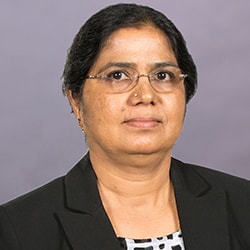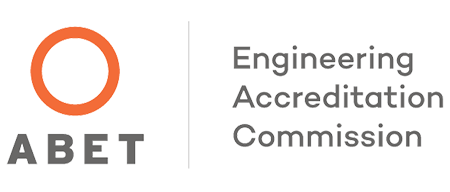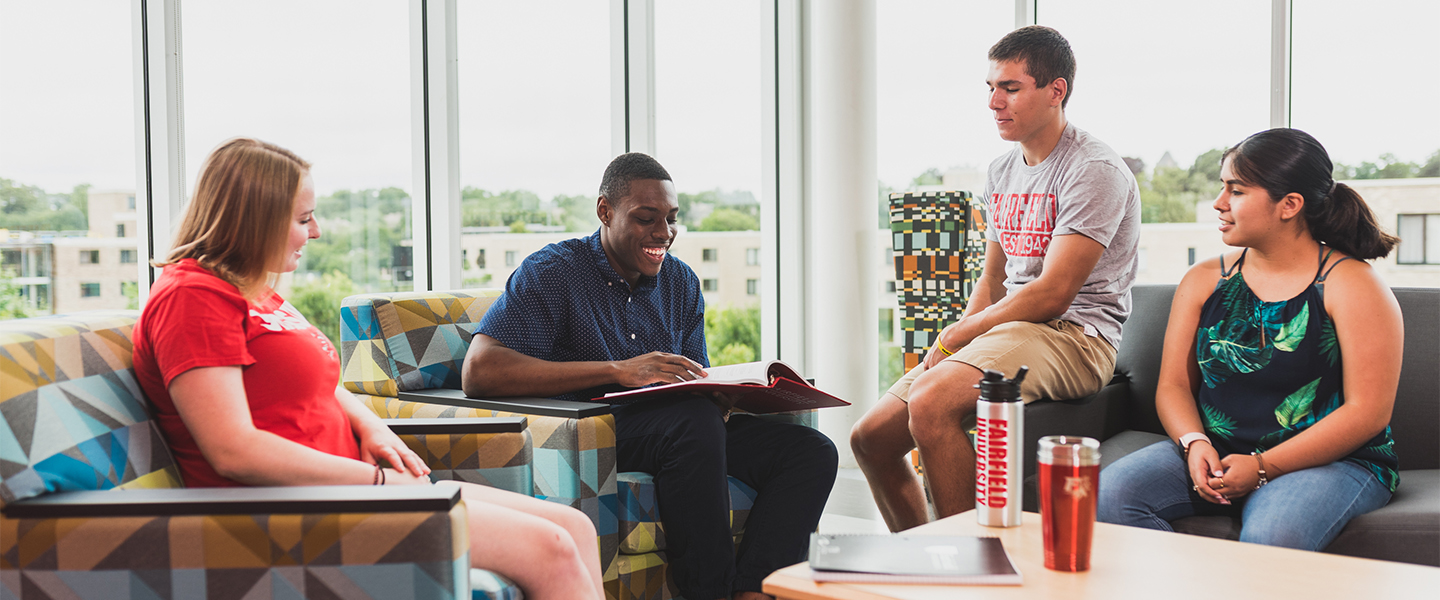Problem-Solving
Identify, formulate, and solve complex engineering problems by applying principles of engineering, science, and mathematics.
Students seeking a strong foundation for the next generation of computer technologies can pursue a computer engineering concentration within the Electrical Engineering program. This option produces high-demand engineers able to develop both hardware and software solutions. Students learn computer design and computer science in addition to electrical engineering, signal processing, physics, mathematics, and the liberal arts.
Industry partnerships and affiliations result in a high employment rate of Fairfield engineering graduates into all sectors of business, government, and academia. Graduates of Fairfield’s electrical engineering program work in industries including power, electronics, robotics and automation, computer hardware and software design – often leading research and development of new systems and applications.
Fairfield's School of Engineering & Computing also has a Master of Science program that allows students to earn a combined BS/MS degree in electrical and computer engineering, in just one additional year.
Fairfield's School of Engineering & Computing also has a five-year program, allowing you to earn a combined BS/MS program in Electrical and Computer Engineering in just one extra year.

Chair, Electrical and Biomedical Engineering
Associate Professor
x2424
P: (203) 254-4100
F: (203) 254-4199
admis@fairfield.edu

Fairfield University’s four-year Bachelor of Science program in electrical engineering is accredited by the Engineering Accreditation Commission of ABET, https://www.abet.org, under the General Criteria and the Electrical, Computer, Communications, Telecommunication(s) and Similarly Named Engineering Program Criteria.
The Program Educational Objectives are broad statements that describe what alumni do within a few years following graduation. The electrical engineering program is committed to graduating engineers who within a few years of their graduation are expected to:
Apply their in-depth understanding in areas of electrical systems to solve problems in a modern technological society as productive engineers and/or enter and succeed in a graduate program.
Function effectively, both individually and within multidisciplinary teams.
Continue as lifelong learners to develop their engineering design abilities, problem-solving skills, and aptitude for innovation.
Practice professional ethics with social responsibility through service in the framework of a global technical community.
Demonstrate the organizational, leadership, and communication skills to achieve success in their chosen careers and make reasoned decisions based on a respect for diversity, and welcome it as a source for creativity, innovation, and inclusive collaboration.
The Electrical Engineering students will graduate from the program with the ability to perform and execute the following student outcomes:
1
Problem-Solving
Identify, formulate, and solve complex engineering problems by applying principles of engineering, science, and mathematics.
2
Produce Solutions
Apply engineering design to produce solutions that meet specified needs with consideration of public health, safety, and welfare, as well as global, cultural, social, environmental, and economic factors.
3
Communicate
Communicate effectively with a range of audiences.
4
Recognize
Recognize ethical and professional responsibilities in engineering situations and make informed judgments, which must consider the impact of engineering solutions in global, economic, environmental, and societal contexts.
5
Cooperate & Collaborate
Function effectively on a team whose members together provide leadership, create a collaborative and inclusive environment, establish goals, plan tasks, and meet objectives.
6
Draw Conclusions
Develop and conduct appropriate experimentation, analyze and interpret data, and use engineering judgment to draw conclusions.
7
Apply Knowledge
Acquire and apply new knowledge as needed, using appropriate learning strategies.
| Fall 2017 Enrollment: | 2017 Graduates: |
| 49 | 13 |
| Fall 2018 Enrollment | 2018 Graduates |
| 46 | 12 |
| Fall 2019 Enrollment | 2019 Graduates |
| 44 | 16 |
| Fall 2020 Enrollment | 2020 Graduates |
| 33 | 13 |
| Fall 2021 Enrollment | 2021 Graduates |
| 32 | 6 |
| Fall 2022 Enrollment | 2022 Graduates |
| 26 | 16 |
| Fall 2023 Enrollment | 2023 Graduates |
| 20 | 8 |
The electrical engineering BS program is accredited by the Engineering Accreditation Commission of ABET. The electrical engineering courses have a strong design component. Students learn the theory in the classroom and put it into practice in the laboratory, resulting in graduates who can practice in industry. The electrical engineering curriculum blends theoretical knowledge with hands-on experiential learning. An interdisciplinary team-based senior design project completes the technical education.
Required Courses
| Major Requirements |
|---|
| Digital Design I and Digital Design I Lab |
| Fundamentals of Programming |
| Introduction to Electric Circuits |
| Electric Circuits Lab |
| Embedded Microcontrollers and Embedded Microcontrollers Lab |
| Fundamentals of Engineering |
| Engineering Graphics I |
| Senior Design Project I |
| Senior Design Project II |
| Five (5) Electrical and Computer Engineering Major electives |
| Frequency Domain Circuit Analysis |
| Introduction to Electronics Circuits and Devices |
| Electronics Circuits Lab |
| Signal and Systems I |
| Analog Electronics Design |
| Analog Electronics Lab |
| Mathematical Analysis |
| Feedback Control Systems |
| One (1) Mechanical Engineering elective |
| Natural Science Requirements |
|---|
| Calculus I for Chemistry, Engineering, and Physics Majors |
| Calculus II for Chemistry, Engineering, and Physics Majors |
| Calculus III for Chemistry, Engineering, and Physics Majors |
| Ordinary Differential Equations |
| Probability Theory |
| General Physics I and General Physics I Lab |
| General Physics II and General Physics II Lab |
| Electricity and Magnetism |
| One (1) additional elective in Natural Sciences (with lab) |
Visit our our academic catalog for detailed course descriptions and more information.
Dual-degree programs reduce the time to a master's degree by at least one year and provide credentials that will serve the student throughout his/her adult professional career. Graduates of the dual-degree program are awarded an Electrical and Computer Engineering MS degree in addition to their Electrical Engineering BS degree. The dual-degree program encourages students to pursue a graduate degree in order to broaden their educational background and their career opportunities. A graduate engineering education is key to innovation and central to economic health. A graduate degree has become far more common in the work place and a master's level engineering education gives a great return on your investment. Students who complete all their requirements may receive their BS degree prior to completing their MS degree.
Check out the Course Catalog for the Electrical and Computer Engineering Five-Year Dual Degree Bachelor and Master of Science Program requirements and course descriptions.

As a Jesuit, Catholic university, Fairfield is dedicated to diversity and inclusion; to radical hospitality in service of racial, social, and economic justice.
The School of Engineering aims to graduate students with leading-edge engineering skills and additional competencies in oral and written communications and critical thinking who possess:
Fairfield's engineering programs graduate liberally educated engineers equipped with knowledge and experiential skills so they may successfully enter the mainstream of industrial/manufacturing activity, education, or government service, or to continue with postgraduate studies. Our close interactions with industry enable employment of our graduates in all sectors of industry, government, and academe.
Learn how Fairfield's Career Services can support your post-graduate goals, and how our tight-knit alumni network can build career and mentoring opportunities that last a lifetime.
There are two types of internships students can attain: internships for academic credit and non-credit internships. Internships for academic credit must be approved by faculty and are connected to an academic course. Some departments have lists of available for-credit internships and some may approve internships that you find on your own as well.
Learn more about what our faculty, students, and alumni are doing, as well as stay up-to-date on our rankings and accolades, programs, and more.
We invite you to view the School of Engineering Update, a year in review of School of Engineering News.
The School of Engineering faculty are a community of leading-edge scholars who are dedicated to their students, research, and teach with passion. If you have an interest in engineering — no matter the focus — our exceptional faculty will get you on the path to success.